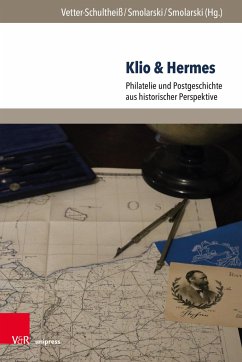
Geschichtsbewusstsein - Geschichtskultur - Public History
Ein spannendes Verhältnis
Herausgegeben: Barricelli, Michele; Yildirim, Lale;Mitarbeit: Barricelli, Michele; Yildirim, Lale; Schwabe, Astrid; Brauer, Juliane; Treiber, Dario; Gundermann, Christine; Burkhardt, Hannes; Reusch, Nina;

PAYBACK Punkte
0 °P sammeln!
Die Paradigmen der Geschichtsdidaktik und ihre Fragestellungen sind seit jeher stetigem Wandel unterworfen. Der Anpassungsdruck vergrößert sich im Augenblick durch Veränderungen in der politischen Kultur (Postkolonialismus, neue Fundamentalismen), soziale Umbrüche, die Digitalisierung aller Lebensbereiche. Antworten auf die sich damit der Disziplin stellende Fragen möchte dieser Band geben. Die Beiträge befassen sich mit der Formung und Bedeutung der alten Zentralkategorie des Geschichtsbewusstseins, welche die zunehmend diversen Lernendengruppen unserer Zeit einschließen muss, sowie mi...
Die Paradigmen der Geschichtsdidaktik und ihre Fragestellungen sind seit jeher stetigem Wandel unterworfen. Der Anpassungsdruck vergrößert sich im Augenblick durch Veränderungen in der politischen Kultur (Postkolonialismus, neue Fundamentalismen), soziale Umbrüche, die Digitalisierung aller Lebensbereiche. Antworten auf die sich damit der Disziplin stellende Fragen möchte dieser Band geben. Die Beiträge befassen sich mit der Formung und Bedeutung der alten Zentralkategorie des Geschichtsbewusstseins, welche die zunehmend diversen Lernendengruppen unserer Zeit einschließen muss, sowie mit Überlegungen zur Geschichtskultur zwischen Urteilsbildung und praktischem Handeln in der Gegenwart. Dazu wird Public History als partizipatorische Professionalität konzipiert, die ausdrücklich Digitalität und Geschichtsdiskurs vereint.
The paradigms of history didactics and its questions have been subjected to constant transformation ever since. The pressure to adapt currently increases due to changes in political culture (postcolonialism, new fundamentalisms), social transformation, and digitalisation of everyday life. This volume aims to provide answers to the questions that arise for this discipline. The contributions are concerned with both the creation and meaning of old categories of history awareness, which are obliged to include the growing number of diverse learners, as well as thoughts on history culture between judgment formation and present practices. Thus, Public History is designed as a participatory proficiency, which explicitly combines both digitality and history discourse.
The paradigms of history didactics and its questions have been subjected to constant transformation ever since. The pressure to adapt currently increases due to changes in political culture (postcolonialism, new fundamentalisms), social transformation, and digitalisation of everyday life. This volume aims to provide answers to the questions that arise for this discipline. The contributions are concerned with both the creation and meaning of old categories of history awareness, which are obliged to include the growing number of diverse learners, as well as thoughts on history culture between judgment formation and present practices. Thus, Public History is designed as a participatory proficiency, which explicitly combines both digitality and history discourse.













